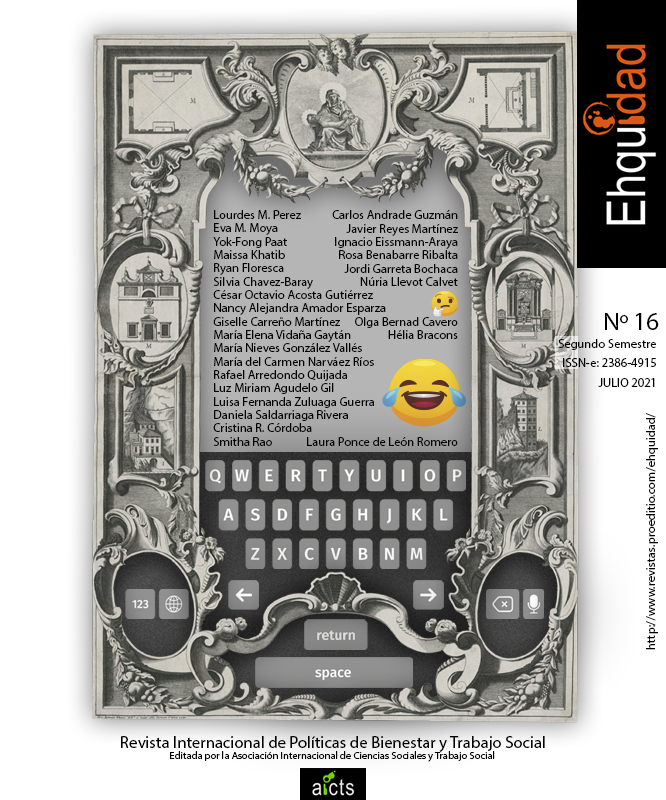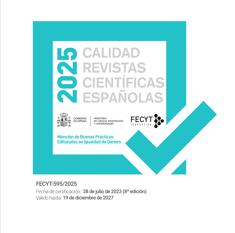Expulsions, a risk factor for school dropout and failure
DOI:
https://doi.org/10.15257/ehquidad.2021.0015Keywords:
School failure, Expelled minors, Coexistence, Resilience, EngagementAbstract
This study tries to analyze the variables influencing school dropout and failure, focusing on a specific population with the highest risk, minors expelled from schools. For this, the data collected during five school years (2014-15 to 2018-19) has been taken, through an initial questionnaire carried out in the Civic Association for Prevention (ACP), within the Project of Attention to Minors in Expulsion (PAMEX), to a total of 523 minors. It can be observed in the results obtained the determination of a profile that characterizes these students, mostly men, of the lower cycle of secondary education, with similar hobbies and enjoyment of free time, as well as the consumption of addictive substances. Highlighting the importance of energy drink abuse. This longitudinal study has made it possible to compare these variables over time and how they have been maintained. Future lines of research and intervention are also proposed, after the confinement suffered by minors due to COVID-19, as well as focused on mitigating variables such as resilience and engagement.
Downloads
References
Benito, A. (2007). La LOE ante el fracaso, la repetición y el abandono escolar. Revista Iberoamericana de Educación, 43, 7-10
Björklund, A. y Chadwick, L. (2003). Intergenerational Income Mobility in Parmanent and Separated Families. Economics Letters, 80, 239-246
Camarata, S. y Woodcock, R. (2006). Sex differences in processing speed: Developmental effects in males and females. Intelligence (34), 231/320
Castro, M. A. (2007). Prevención e intervención ante problemas de conducta. Madrid, Wolters Kluwer España, S.A.
Cerrón, L. A. (2000). La conflictividad escolar como reflejo social: tomando una perspectiva global del problema. Tarbiya, 25, 7-19
Fernández, M., Mena, L. y Riviere, G. (2010). Fracaso y abandono escolar España. Barcelona, Fundación “La Caixa”.
García, A. (2005). El abandono escolar temprano en España: programas y acciones para su reducción. Revista Galega de Ensino. Ano 13 núm. 47, 1443-1464
Garfella, P. R., Gargallo, B. y Sánchez, F. (2001). Medidas y estrategias para la reducción del absentismo escolar. Revista de Estudios de Juventud, 52, 27-36
Herrera, Mª. E. (1999). Fracaso escolar, códigos y disciplina: una aproximación etnográfica. Ultima Década núm. 10, 1-9
Junta de Andalucía (2018). La población andaluza ante las drogas XIV. Sevilla, Consejería de Igualdad y Políticas Sociales. Junta de Andalucía
Lee, V. E. y Burkam, D. T. (2000). Droping out of High School: The Role of School Organization and Structure. Cambridge, MA, Harvard Graduate School of Education
Martínez-Ferrer, B. y Moreno, D. (2017). Dependencia de las redes sociales virtuales y violencia escolar en adolescentes. International Journal of Developmental and Educational Psychology. INFAD, nº 1, 105-114
Mena, L., Fernández, M. y Riviére, J. (2010). Desenganchados de la educación: procesos, experiencias, motivaciones y estrategias del abandono y del fracaso escolar. Revista Educación, número extraordinaria, 119-145
Ministerio de Educación (2020). Datos y cifras. Curso escolar 2018-2019. Disponible en https://sede.educacion.gob.es/publiventa/datos-y-cifras-curso-escolar-20182019/ensenanza-estadisticas/22495 (14 julio de 2020)
Ministerio de Sanidad, Consumo y Bienestar Social (2017). Encuesta sobre alcohol y drogas en España (EDADES), 1995-2017. Madrid, Delegación del Gobierno para el Plan Nacional sobre Drogas. Disponible en https://pnsd.sanidad.gob.es/profesionales/sistemasInformacion/sistemaInformacion/pdf/EDADES_2017_Informe.pdf (14 julio de 2020)
Moñino, M., Piñero-Ruiz, E., Arense, J. y Cerezo, F. (2013). Violencia escolar y consumo de alcohol y tabaco en estudiantes de Educación Secundaria. Psychology and Education, Vol. 3, nº 2, 137-147
OCDE (2006). Where inmigrant students succeed. A Comparative Review of Performance and Engagement in Pisa 2003. Paris, OCDE
Pineda-Alfonso, J. A., y Pérez, F. F. G. (2014). Convivencia y disciplina en el espacio escolar: discursos y realidades. Scripta Nova. Revista Electrónica de Geografía y Ciencias Sociales, nº 494 (05), 1-21
Ribaya, F.J. (2004). El absentismo escolar en España. SABERES: Revista de estudios jurídicos, económicos y sociales, V. 2, 1-26
Robison, S., Jaggers, J., Rhodes, J., Blackmond, B. R. y Church, W. (2017). Correlates of educational success: Predictors of school dropout and graduation for urban students in the Deep South. Children and Youth Services Review, 73, 37-46
Sáez, L. (2005). La educación social: intervención socioeducativa en la problemática del absentismo escolar. Indivisa. Boletín de estudios e investigación, nº 6, 229 – 240
Salanova, M., Martínez, I., Bresó, E., Llorens, S., y Grau, R. (2005). Bienestar psicológico en estudiantes universitarios: facilitadores y obstaculizadores del desempeño académico. Anales de Psicología, 21, 170-180
Schaufeli, W.B., Salanova, M., Gonzalez-Roma. V. y Bakker, A.B. (2002). The measurement of engagement and burnout and: A confirmative analytic approach. Journal of Happiness Studies, 3, 71-92












